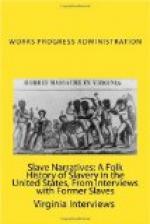In connection with the stories of ex-slaves, please send in to this office copies of State, county, or city laws affecting the conduct of slaves, free Negroes, overseers, patrollers, or any person or custom affecting the institution of slavery. It will, of course, not be necessary to send more than one copy of the laws that were common throughout the state, although any special law passed by a particular city would constitute worthwhile material.
In addition, we should like to have you collect and send in copies of any laws or accounts of any established customs relating to the admission to your State of bodies of slaves from Africa or other sections, the escape of slaves, etc. Also, we should like to see copies of advertisements of sales of slaves, published offers of rewards for fugitive slaves, copies of transfers of slaves by will or otherwise, records of freeing of slaves, etc. Public records of very particular interest regarding any transaction involving slaves should be photostated and copies furnished to the Washington office.
Furthermore, contemporary accounts of any noteworthy occurrences among the Negroes during slavery days or the Reconstruction period should be copied, if taken from contemporary newspapers. If such records have been published in books, a reference to the source would be sufficient. We have been receiving a large number of extremely interesting stories of ex-slaves. The historic background of the institution of slavery, which should be disclosed with the information we are now requesting, will be very helpful in the execution of the plans we have in mind.
Copies sent to:
Alabama Georgia Maryland North Carolina
Tennessee
Arkansas Kentucky Mississippi Oklahoma
Texas
Florida Louisiana Missouri South Carolina
Virginia
West
Virginia
Ohio
Kansas
[Document 7]
Notes by an editor on dialect usage in accounts by interviews with ex-slaves. (To be used in conjunction with Supplementary Instructions 9E.)
Simplicity in recording the dialect is to be desired in order to hold the interest and attention of the readers. It seems to me that readers are repelled by pages sprinkled with misspellings, commas and apostrophes. The value of exact phonetic transcription is, of course, a great one. But few artists attempt this completely. Thomas Nelson Page was meticulous in his dialect; Joel Chandler Harris less meticulous but in my opinion even more accurate. But the values they sought are different from the values that I believe this book of slave narratives should have. Present day readers are less ready for the over-stress of phonetic spelling than in the days of local color. Authors realize this: Julia Peterkin uses a modified Gullah instead of Gonzales’ carefully spelled out Gullah. Howard Odum has questioned the use of goin’ for going since the g is seldom pronounced even by the educated.




